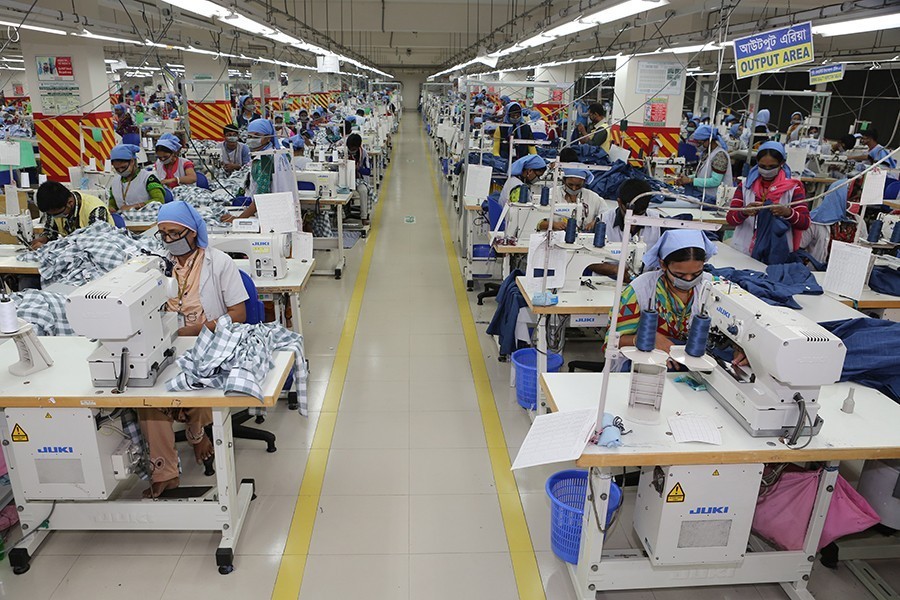Leaders of the country's textile and ready-made garment (RMG) sector on Monday called for more local and foreign direct investment (FDI) in their backward-linkage industries, especially in woven and man-made fabrics manufacturing, to grab the growing global demand for such items.
Bangladesh needs to strengthen its backward linkage industries mainly to reduce the gap between supply and demand of raw materials, and thus to shorten lead-time.
The primary textile millers can supply only 35 to 40 per cent of required woven fabrics to the exporters, the RMG sector leaders observed at a business session of the two-day International Investment Summit 2021 Bangladesh.
The Bangladesh Investment Development Authority (BIDA) organised the summit that began on Sunday at Radisson Blu Dhaka Water Garden in the city.
Dhaka North City Corporation Mayor Md Atiqul Islam chaired the business session, while Sparrow Group of Industries Managing Director Shovon Islam moderated the programme.
High value-added and non-cotton textiles sector is a highly potential area of investment in Bangladesh. The RMG industry is increasingly focusing on apparels made from synthetic fibres to meet the rising demand in the global market, Bangladesh Garment Manufacturers and Exporters Association (BGMEA) President Faruque Hassan said.
"It is the high time to diversify our export basket to non-cotton, and this is a potential area of investment."
About 75 per cent of the total global apparel consumption is non-cotton, whereas Bangladeshi exportable garment items are largely based on cotton, which is more than 74 per cent, Mr Faruque also said.
"Of the 433 spinning mills in Bangladesh, only 27 mills produce synthetic and acrylic yarns."
Use of local fabrics would be a requirement for Bangladesh to avail European GSP Plus facility as soon as the current Everything But Arms (EBA) scheme phases out after the country's graduation from LDC.
"So we need to have more investment in the textile sector," the BGMEA president added.
President of Bangladesh Textile Mills Association (BTMA) Mohammad Ali Khokon welcomed FDI in setting up mills to produce woven fabrics and man-made fibres to fill the current 60 per cent shortage of woven fabrics, saying that the local textile mills can meet only 30-40 per cent of woven fabric requirements.
He sought policy supports, including tax waiver, for the sector for the next 10 years to attract both local and foreign investment.
Marks & Spencer Bangladesh Sourcing Office Head Shwapna Bhowmick said Bangladesh is the biggest sourcing country for the British retailer, and the company is thinking of buying more (items from here) because of the local suppliers' commitment.
She focused on a strong backward linkage industry in Bangladesh, saying that they sourced huge quantities of fabrics, and related raw materials were imported from China, Korea and Taiwan to produce lingerie, suits and active wears in the country.
Ease of doing business was also important for Bangladesh, as all the process of investment was still dependent on manual systems, she noted, emphasising skilling, re-skilling and multi-skilling of workers for future business.
"Bangladesh is becoming the most important sourcing destination for RMG, as China is not interested in expanding the industry further. We like to invite investors to invest in the country," BGMEA former president Anwar-ul Alam Chowdhury Parvez said.
Bangladeshi RMG would not get GSP facility in the US market, he said, terming the issue 'political'.
"Without GSP, Bangladesh is growing in the US market, and now we are not worried about the preferences in the market," opined Mr Parvez, also president of Bangladesh Chamber of Industries (BCI).
Executive President of Bangladesh Knitwear Manufacturers and Exporters Association (BKMEA) Mohammad Hatem requested the government to set up more technical and vocational training institutions across the country, so that they, in collaboration with industries, can provide required trainings according to the need of the sectors.


